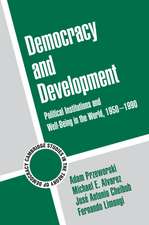The Quality of Democracy in Eastern Europe: Public Preferences and Policy Reforms
Autor Andrew Robertsen Limba Engleză Paperback – 10 sep 2014
| Toate formatele și edițiile | Preț | Express |
|---|---|---|
| Paperback (1) | 285.16 lei 6-8 săpt. | |
| Cambridge University Press – 10 sep 2014 | 285.16 lei 6-8 săpt. | |
| Hardback (1) | 719.39 lei 6-8 săpt. | |
| Cambridge University Press – 11 oct 2009 | 719.39 lei 6-8 săpt. |
Preț: 285.16 lei
Nou
Puncte Express: 428
Preț estimativ în valută:
54.58€ • 59.31$ • 45.88£
54.58€ • 59.31$ • 45.88£
Carte tipărită la comandă
Livrare economică 21 aprilie-05 mai
Preluare comenzi: 021 569.72.76
Specificații
ISBN-13: 9781107417571
ISBN-10: 1107417570
Pagini: 252
Ilustrații: 13 b/w illus. 17 tables
Dimensiuni: 156 x 234 x 14 mm
Greutate: 0.39 kg
Editura: Cambridge University Press
Colecția Cambridge University Press
Locul publicării:New York, United States
ISBN-10: 1107417570
Pagini: 252
Ilustrații: 13 b/w illus. 17 tables
Dimensiuni: 156 x 234 x 14 mm
Greutate: 0.39 kg
Editura: Cambridge University Press
Colecția Cambridge University Press
Locul publicării:New York, United States
Cuprins
Preface; 1. Introduction; Part I. Conceptual Analysis: 2. Assessing the quality of democracy; Part II. Statistical Analysis: Introduction to the Statistical Analyses: 3. Electoral accountability; 4. Mandate responsiveness; 5. Policy responsiveness; Part III. Case Study Analysis: Introduction to the Case Studies: 6. The politics of pension reforms; 7. The politics of housing reforms; Part IV. Implications: 8. Explaining democratic quality; 9. Conclusions; Bibliography.
Recenzii
“What is the quality of democracy in postcommunist East Central Europe? In this provocative and intriguing analysis, Andrew Roberts finds surprising answers to this important question and demonstrates how these countries overcame both the legacies of authoritarian rule and the challenges of regime transformation.”
– Anna Grzymala-Busse, University of Michigan
“Roberts has produced a fascinating study of democratic quality in Central and Eastern Europe. The rise of postcommunist Central European states to the top ranks of world democracies has been nothing short of remarkable. But how substantial is this democracy? Roberts shows that by measures of electoral accountability, mandate responsiveness, and policy responsiveness, Central European countries do quite well. Central European voters punish incumbents and are consulted or included in policy making. Most interestingly, Roberts persuasively identifies a cause for the surprisingly high quality of postcommunist democracy: socioeconomic modernization. Despite, or perhaps because of, communism, Central Europe has a highly ‘educated, relatively egalitarian, middle-class society’ that demands – and gets – representation.”
– Mitchell A. Orenstein, Johns Hopkins University
“Few works in comparative politics consider the normative foundations of democracy. In this remarkable book, Roberts develops a rigorous conceptual basis for the idea of democratic quality, defined in terms of citizen rule. Drawing on multiple and diverse data sources, Roberts applies a sophisticated conceptual framework to the young democracies of postcommunist Europe, challenging the common presumption that they are of lower quality than established democracies. Instead, as rigorous statistical analysis and in-depth case studies show, citizen rule may even be more salient in these and other new democracies. This important study offers a clear, comprehensive, and theoretically informed account of the state of democracy in Eastern Europe 20 years after the demise of communism. It is required reading not only for comparativists already interested in the region but also for all scholars of democratic politics.”
– Anna Seleny, Tufts University
“In this outstanding and timely book, Roberts makes a groundbreaking contribution: He brings conceptual clarity and methodological rigor to the study of the quality of democracy. For Roberts, linkages between citizens and policy-makers determine democratic quality; he shows us how to measure these linkages using quantitative and qualitative methods. In the East European cases this yields an important result: these new democracies are relatively robust.”
– Milada Anna Vachudova, University of North Carolina at Chapel Hill
– Anna Grzymala-Busse, University of Michigan
“Roberts has produced a fascinating study of democratic quality in Central and Eastern Europe. The rise of postcommunist Central European states to the top ranks of world democracies has been nothing short of remarkable. But how substantial is this democracy? Roberts shows that by measures of electoral accountability, mandate responsiveness, and policy responsiveness, Central European countries do quite well. Central European voters punish incumbents and are consulted or included in policy making. Most interestingly, Roberts persuasively identifies a cause for the surprisingly high quality of postcommunist democracy: socioeconomic modernization. Despite, or perhaps because of, communism, Central Europe has a highly ‘educated, relatively egalitarian, middle-class society’ that demands – and gets – representation.”
– Mitchell A. Orenstein, Johns Hopkins University
“Few works in comparative politics consider the normative foundations of democracy. In this remarkable book, Roberts develops a rigorous conceptual basis for the idea of democratic quality, defined in terms of citizen rule. Drawing on multiple and diverse data sources, Roberts applies a sophisticated conceptual framework to the young democracies of postcommunist Europe, challenging the common presumption that they are of lower quality than established democracies. Instead, as rigorous statistical analysis and in-depth case studies show, citizen rule may even be more salient in these and other new democracies. This important study offers a clear, comprehensive, and theoretically informed account of the state of democracy in Eastern Europe 20 years after the demise of communism. It is required reading not only for comparativists already interested in the region but also for all scholars of democratic politics.”
– Anna Seleny, Tufts University
“In this outstanding and timely book, Roberts makes a groundbreaking contribution: He brings conceptual clarity and methodological rigor to the study of the quality of democracy. For Roberts, linkages between citizens and policy-makers determine democratic quality; he shows us how to measure these linkages using quantitative and qualitative methods. In the East European cases this yields an important result: these new democracies are relatively robust.”
– Milada Anna Vachudova, University of North Carolina at Chapel Hill
Notă biografică
Descriere
This book presents a positive assessment of democratic quality as it has developed in ten postcommunist countries.
















